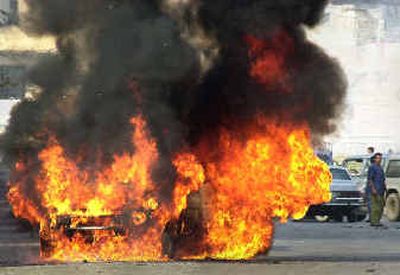U.S. forces attack Fallujah

NEAR FALLUJAH, Iraq – U.S. forces stormed into the western outskirts of Fallujah early today, seizing the main city hospital and securing two key bridges over the Euphrates river in what appeared to be the first stage of the long-expected assault on the insurgent stronghold.
An AC-130 gunship raked the city with 40 mm cannon fire as explosions from U.S. artillery lit up the night sky. Intermittent artillery fire blasted southern neighborhoods of Fallujah, and orange fireballs from high explosive airbursts could be seen above the rooftops.
U.S. officials said the toughest fight was yet to come – when American forces enter the main part of the city on the east bank of the river, including the Jolan neighborhood where insurgent defenses are believed the strongest.
The initial attacks on Fallujah began just hours after the Iraqi government declared 60 days of emergency rule throughout most of the country as militants dramatically escalated attacks, killing at least 30 people, including two Americans.
Several hundred Iraqi troops were sent into Fallujah’s main hospital after U.S. forces sealed off the area. The troops detained about 50 men of military age inside the hospital, but about half were later released.
The invaders used special tools, powered by .22 caliber blanks, to break open door locks. A riflelike crackle echoed through the facility. Many patients were herded into hallways and handcuffed until troops determined whether they were insurgents hiding in the hospital.
Dr. Salih al-Issawi, head of the hospital, said he had asked U.S. officers to allow doctors and ambulances go inside the main part of the city to help the wounded but they refused. There was no confirmation from the Americans.
“The American troops’ attempt to take over the hospital was not right because they thought that they would halt medical assistance to the resistance,” he said by telephone to a reporter inside the city. “But they did not realize that the hospital does not belong to anybody, especially the resistance.”
During the siege of Fallujah last April, doctors at the hospital were a main source of reports about civilian casualties, which U.S. officials insisted were overblown. Those reports generated strong public outage in Iraq and elsewhere in the Arab world, prompting the Bush administration to call off the offensive.
Sunday’s action began after sundown on the outskirts of the city, which has been sealed off by U.S. and Iraqi forces, and the minaret-studded skyline was lit up with huge flashes of light.
Flares were dropped to illuminate targets, and defenders fought back with heavy machine gunfire. Flaming red tracer rounds streaked through the sky from guerrilla positions inside the city, 40 miles west of Baghdad.
As dawn broke today over Iraq, the roar of jet aircraft could be heard in Baghdad heading west toward Fallujah.
Before the assault began, U.S. commanders warned troops to expect the most brutal urban fighting since the Vietnam War.
Underscoring the instability elsewhere in Iraq, several heavy explosions thundered through the capital even as government spokesman Thair Hassan al-Naqeeb was announcing the state of emergency, which applies throughout the country except for Kurdish-ruled areas in the north.
Iraqi interim Prime Minister Ayad Allawi said the state of emergency is a “very powerful message that we are serious” about reining in insurgents before elections set for late January.
“We want to secure the country so elections can be done in a peaceful way and the Iraqi people can participate in the elections freely, without the intimidation by terrorists and by forces who are trying to wreck the political process in Iraq,” he told reporters.
Allawi said nothing in public about the beginning of the attack in Fallujah, although U.S. commanders have said it would be his responsibility to order the storming of the city.
Insurgents, meanwhile, waged a second day of multiple attacks across the restive Sunni Triangle north and west of Baghdad, storming police stations, assassinating government officials and setting off deadly car bombs. About 60 people have been killed and 75 injured in the two days of attacks.
At dawn, armed rebels stormed three police stations in Haditha and Haqlaniyah, 140 miles northwest of Baghdad, killing 22 policemen. Some were lined up and shot execution-style, according to police and hospital officials.
Three attacks on U.S. convoys in and around Baghdad killed two American soldiers and wounded five others, the military said. Residents reported grenades setting police cars aflame on Haifa Street in the heart of the capital.
A car bomb also exploded near the Baghdad home of Iraq’s finance minister, Adil Abdel-Mahdi, a leading Shiite politician. Abdel-Mahdi and his family were not home at the time, but the U.S. military said the bomb killed one Iraqi bystander and wounded another. A U.S. patrol came under small-arms fire as it responded, wounding one soldier, a statement said.
A heavy explosion also shook central Baghdad Monday morning, but the cause was not known. The U.S. military had no immediate response.
In a Web posting, the al Qaeda affiliate group of Abu Musab al-Zarqawi, believed headquartered in Fallujah, claimed responsibility for the attacks on Haditha and Haqlaniyah.
“The lions stormed (Haditha’s) police directorate and killed everyone there …With this operation, the city has been completely liberated. The lions have been wandering in the city until late today,” said the statement, which could not be authenticated.
The widespread insurgent attacks seemed aimed at relieving the pressure on Fallujah, where about 10,000 American troops – including two Marine battalions and an Army battalion – were massed for the assault. Two Iraqi brigades also stood by.
The emergency decree lays the groundwork for a severe crackdown in areas where guerrillas operate.